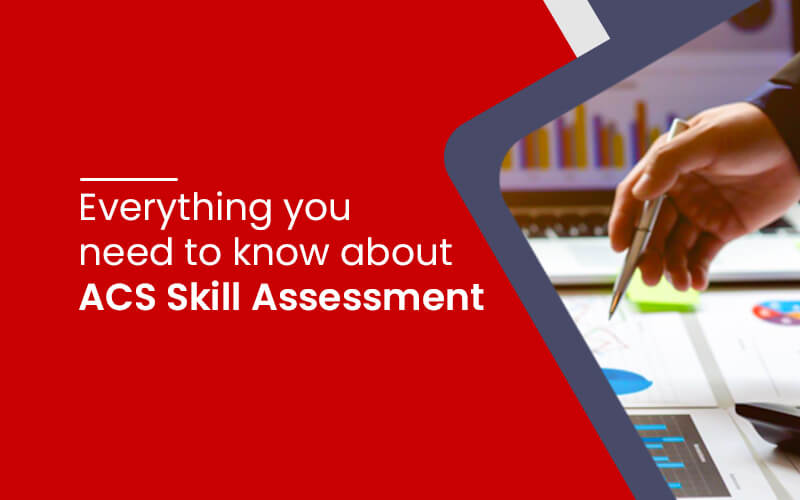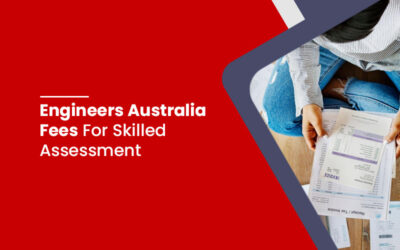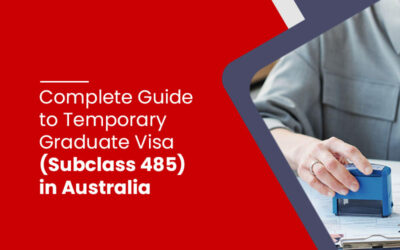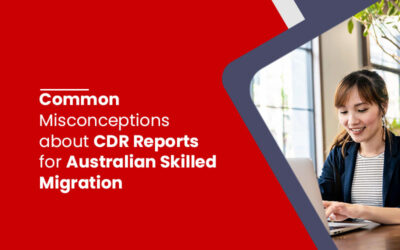Everything you need to know about ACS Skill Assessment

Table of Contents
ACS, or the Australian Computer Society, is an affiliation that represents the ICT (Information Technology and Communication Technology) of Australia. The ACS leads the skill assessment process for migrants to improve the data and correspondence innovation assets in Australia.
So, ICT experts who need to settle in Australia consistently need to have their capabilities and skills assessed by the ACS to ensure they are eligible for a visa.
Australia’s Information and Communication Technologies (ICT) sector has expanded significantly. Every year, technology and information generate approximately $23 billion. Government funding continues to support the development of this industry. They developed a skills assessment test to ensure that only the best candidates are admitted to their programs.
With the proper tools and knowledge, navigating the ACS skill assessment can be easier. That is why we are here to assist you.
Introduction to Australian Computer Society(ACS)
The Australian Computer Society (ACS) is Australia’s professional association and the peak body for the technology sector.
ACS maintains the standards against which a person’s skills are evaluated as appropriate for their nominated occupation. ACS is proud to play such an important role in Australia’s development and advancement of technology talent. The list of eligible skilled occupations includes a list of ICT skills occupations evaluated by ACS.
The guidelines below are intended to help applicants successfully navigate their skilled migration application. Please keep in mind that ACS provides information on the eligibility requirements for applying for a skills assessment through the Migration Skills Assessment program; it does not provide information on migration or visa requirements. Applicants should contact the Department of Home Affairs regarding visa and migration requirements.
ACS application process
Who can apply for ACS skill assessment?
ACS accepts applicants who can illustrate qualifications and experience in a broad definition of information and communication technology (ICT) – a profession trusted by society for the idea, design, execution, maintenance, management, and disposal of ICT infrastructure, goods, procedures, and services within a broad professional context. All applicants must provide evidence of their educational qualifications, employment, and identification as part of their application.
Which assessment path should you take?

There are several migration options available for applications:
1. Temporary Graduate (TG) – only for Australian Bachelor’s degree or higher.
2. Post-Australian Study (PAS) – only for Australian Bachelor’s degree or higher.
3. General Skills Assessment
4. Recognition of Prior Learning (RPL)
Pathway 1: Temporary Graduate (TG)
Graduates with a Bachelor’s degree or higher in Australia are eligible for the Temporary Graduate pathway. This skills evaluation is only for qualifications and can be used to apply for a subclass 485 visa.
- Only occupations on the subclass 485 Medium and Long-term Strategic Skills List (MLTSSL) are eligible for the Temporary Graduate pathway.
- The suitability criteria require you possess an Australian bachelor’s degree or higher in an area closely related to the nominated occupation (ANZSCO).
Pathway 2: Post-Australian Study (PAS)
The Post Australian Study pathway is for graduates with an Australian Bachelor’s degree or higher who want a skill assessment for general migration purposes. It is necessary to have relevant ICT experience or to have completed an ACS Professional Year program.
- It is necessary to have an Australian Bachelor’s degree or higher in ICT closely related to the nominated occupation (ANZSCO) as well as to meet one of the following requirements for a skills assessment:
- One year of relevant work experience gained after completing the relevant Australian degree, or
- Successful completion of an ACS Professional Year Program
Pathway 3: General Skills Assessment
It is appropriate for candidates with tertiary ICT qualifications and ICT employment.
| AQF comparable Qualification | ICT Content | ICT Content relevance to nominated ANZSCO | Relevant experience requirements |
| Bachelor’s Degree or higher | closely related to your nominated occupation | To meet the suitability criteria, you must have 2 years of relevant work experience completed within the past 10 years or 4 years of relevant work experience completed anytime in your past. | |
| ICT Major | NOT closely related to your nominated occupation | You need 4 years of relevant work experience completed anytime in your past work history to meet the suitability criteria. | |
| closely related to your nominated occupation | The suitability criteria require 5 years of relevant work experience completed within the past 10 years or 6 years of relevant work experience completed at any time in your past work history. | ||
| ICT Minor | NOT closely related to your nominated occupation | Your past work history must include 6 years of relevant experience. | |
| Diploma Advanced Diploma Associate Degree | ICT Major | closely related to your nominated occupation | To meet the suitability criteria, you must have at least 5 years of relevant work experience within the last 10 years or 6 years of relevant work experience completed at any time in your past work history. |
| ICT Major | NOT closely related to your nominated occupation | Your past work history must include 6 years of relevant experience. |
Pathway 4: Recognition of Prior Learning (RPL)
The RPL application pathway is intended for applicants who have tertiary qualifications with little or no ICT content or who do not have any recognized tertiary qualifications.
- Suppose your qualification is an AQF Diploma or higher with insufficient ICT content. You will need 6 years of relevant work experience and a suitable Recognition of Prior Learning (RPL) application to meet the suitability requirements.
- Applicants must have 8 years of relevant work experience and a suitable Recognition of Prior Learning (RPL) application if they do not possess a recognized tertiary education.
Read More: Is it worth migrating to Australia for ICT professionals? 🤔🤔
Within your RPL application, you must demonstrate how you obtained your ICT knowledge and submit two Project Reports. It is required that each report contains a description of a career episode and evidence of the application of the claimed ICT skills.
Suitability criteria for skill assessment
Find the suitability criteria for the 4 assessment pathways to help you with your application.
| Required Level of AQFcomparability | Required ICT Content | Required Qualification Closely Related to ANZSCO | Required Relevant Work Experience | Application Type |
| Australian Bachelor Degree or higher | ICT Major | Closely related to the nominated occupation | No Work Experience Required | Temporary Graduate -485 |
| Australian Bachelor Degree or higher | ICT Major | Closely related to the nominated occupation | 1 year of relevant ICT work experience completed after the completion date of the relevant Australian qualification or completion of an ACS Professional Year Program. | Post Australian Study SkillsAssessment |
| Bachelor’s Degree or higher | ICT Major | Closely related to the nominated occupation | 2 years of relevant ICT work experience completed in the last 10 years. OR 4 years of relevant ICT work experience completed anytime in past work history. | Skills |
| Bachelor’s Degree or higher | ICT Major | NOT closely related to the nominated occupation | 4 years of relevant ICT work experience completed anytime in past work history. | Skills |
| Bachelor’s Degree or higher | ICT Minor | Closely related to the nominated occupation | 5 years of relevant ICT work experience completed in the last 10 years. OR 6 years of relevant ICT work experience completed anytime in past work history. | Skills |
| Bachelor’s Degree or higher | ICT Minor | NOT closely related to the nominated occupation | 6 years of relevant ICT work experience completed anytime in past work history. | Skills |
| Diploma Advanced Diploma Associate Degree | ICT Major | Closely related to the nominated occupation | 5 years of relevant ICT work experience completed in the last 10 years. OR 6 years of relevant ICT work experience completed anytime in past work history. | Skills |
| Diploma Advanced Diploma Associate Degree | ICT Major | NOT closely related to the nominated occupation | 6 years of relevant ICT work experience completed anytime in past work history. | Skills |
| Non-ICT Diploma or higher | N/A | N/A | 6 years of relevant ICT work experience completed anytime in past work history plus a successful RPL application. | RPL |
| N/A | N/A | N/A | 8 years of relevant ICT work experience completed anytime in past work history plus a successful RPL application. | RPL |
ACS qualifications
A candidate’s qualification must fit within a broad definition of ICT – a profession trusted by society to conceptualize, design, implement, maintain, manage, and dispose of ICT infrastructure, products, processes, and services in a wide professional context. It is expected that one important goal will be to educate students to be ICT professionals.
Program structure promotes a gradual shift from directed learning in the first year to independent learning in the second year. The structure will aid in developing a student’s knowledge and skills.
1. Vendor certifications
The ACS no longer evaluates vendor certifications. The only applicants eligible for RPL should submit evidence of any completed vendor certificates that demonstrate their current knowledge of their chosen ANZSCO occupation code.
2. Accredited Australian ICT qualifications
Australian qualifications accredited by the ACS generally meet the ICT Major Criteria. Please remember that this does not ensure that the qualification will be evaluated as closely related to the ANZSCO occupation of choice.
3. ICT Content Assessment in Tertiary Qualifications
Qualifications in computing are evaluated based on whether they have an ICT Major or an ICT Minor. Non-ICT qualifications include ICT content that is less than a minor.
ACS document checklists
Generally, the documents you need to apply for a visa are intended to assess your skills and verify your identity. As a result, you must submit a few educational and award documents.
Some of the primary documents you must submit (upload) are as follows:
1. Identity documents
- Official passport
- Any other government-issued document which has the applicant’s photograph
- CV/Resume
- Evidence of name change(if any)
2. Educational documents
- Degree or award certificate
- Transcript
3. ACS employment reference letter
When preparing your online applications, you must break down employment episodes to show “Australia” and “outside of Australia” employment:
Australia Employment:
- In the application, each period of employment in Australia must be listed separately. This includes a secondment to Australia as part of an overseas job.
Employment outside Australia:
- Applicants who have worked in the same or a closely related occupation for the same employer in multiple countries (aside from Australia) should list this in their online application as one time spent working abroad.
- It is necessary to record each period of employment outside of Australia separately in the online application.
ACS can only evaluate work experience that includes the required information in the employment reference. Please ensure that all the necessary information is provided for each employer to ensure that each employment episode is suitable for assessment.
Learn More: Tips to prepare a perfect CV/Resume for EA. 💪💪
Any applications that do not meet these requirements will not be considered for employment.
All employment references must be on company letterhead, signed and dated by an authorized person from the organization (digital signatures are acceptable). All references must include the following specific information from the employer.
- Employment Start and End Dates – These should be specific dates in the DD/MM/YYYY format. If your role is “current,” the employer reference letter should include the start and end dates and the word “CURRENT.”
- Position title – for example, “Civil Engineer”
- Duties Performed Description – The experience must be relevant to the nominated occupation and unique for each employment episode.
- Hours worked – full-time or part-time, and actual hours worked per week.
- Country where employment was obtained
- Signatory contact information, including contact number and official email address (no personal email addresses)
[Note: Please do not send employment agreements, offer letters, appointment letters, or job descriptions, as these are not assessable and will cause your application to be delayed.]
4. Payment evidence for ACS

You must provide ACS with sufficient proof of paid employment and pay per the skill required for your position. Payment evidence must include at least two types of documentary proof, with both sources of proof demonstrating payments made at the start and end of each employment episode claimed in the application (or most recent, if the claimant is still employed).
Cash payments won’t be taken into account as sufficient proof of employment.
Read More: What is the KA02 report and its significance on ICT applicants? 💥💥
When submitting two types of payment evidence, at least one must be from a source other than the employer (see list below). Acceptable payment proof includes:
- Official government tax records or documents, including payment summaries and group certificates (citing company and applicant name). Tax returns from the applicant are not accepted as supporting materials.
- Payslips mentioning the names of the applicant and the employer,
- Employment-related insurance/superannuation/provident fund documents mentioning the applicant’s and employee’s names,
- Bank statements showing the applicants’ names and salary payments made by the employer.
5. Statutory Declaration and Affidavit
A Statutory Declaration or Affidavit is a legal written statement signed in the presence of an authorized witness.
Statutory Declarations and Affidavits will be accepted only if the applicant cannot obtain a work reference. ACS need an explanation from the applicant’s employer why they cannot provide an employment reference letter.
An authorized witness must declare all Statutory Declarations or Affidavits. The document must include the date and place of the declaration and the fact that it was Declared Before, Signed Before, or Witnessed Before the Authorized Witness by the Referee.
Learn More: Role of National Engineering Register(NER) for Engineers. 😊😊
If you need to obtain a Statutory Declaration or Affidavit outside of Australia, please get in touch with an Australian Embassy or consult the legal standards of the country in which you are applying. A third-party coworker must write the Statutory Declaration or Affidavit in a managerial or supervisory role, not by the applicant. Self-written Statutory Declarations or Affidavits will be rejected.
ACS Skill Assessment processing time
Applications are processed as quickly as possible, and the quality level of the supporting documentation and information causes any delays. The skills assessment can take up to 8-10 weeks to complete, and if ACS requests additional documents, the process may take longer.
ACS Skill Assessment processing cost
| Application type | Fee |
| Temporary Graduate – 485 Skills Assessment | $500 |
| Post-Australian Study Skills Assessment | $530 |
| Skills (general application) | $530 |
| Recognition of Prior Learning (RPL) | $575 |
| Review Application | $395 |
| Appeal Application | $395 |
Do you have concerns about the ACS Skill Assessment?
Every major move is frightening and overwhelming, but the process can be smooth and efficient with the right tools. That is why getting the best assistance is critical to your success.
While ACS skill assessment assists the Australian government in selecting the best candidate for employment, it can be stressful for candidates, particularly if you are new to all of this. That is why hiring an experienced consultant is critical to your success. A good consultant will be able to walk you through the point system.
CDRWritersAustralia will provide you with the best assistance in every aspect of skill assessment. Our experienced professionals will guide you to get positive skill assessments. We also provide documentation services such as CDR report, RPL report, KA02 report, Resume for ACS, and many more.
Recent Posts
- Stage 1 Competency Standard for Professional Engineer December 4, 2023
- Secure Your Future: The Most In Demand Jobs for Skilled Migrants to Australia in 2024 November 3, 2023
- Engineers Australia Fees For Skills Assessment October 2, 2023
- A Comprehensive Guide to Australia Partner Visas: Requirements, Process, and Tips August 31, 2023
- Unlocking Your Dreams: Ultimate Guide to Australian PR Pathways August 11, 2023






